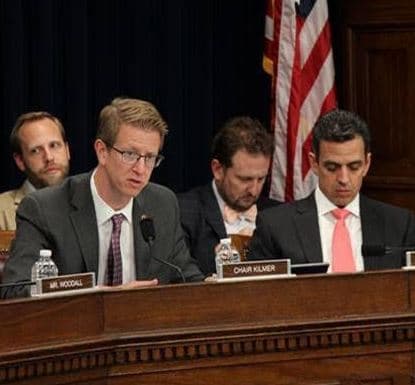Select Committee Unanimously Endorses Proposals to Improve Life on Capitol Hill

WASHINGTON – Before leaving Washington to work in their home districts, members of the House Select Committee on the Modernization of Congress unanimously endorsed a second round of bipartisan proposals to improve life on Capitol Hill.
“This committee is committed to delivering solutions that make Congress more reflective of and responsive to the American people,” said Committee Chair Derek Kilmer, D-Wash., and Vice Chair Tom Graves, R-Ga., in a joint statement released after the panel’s final session before the August recess.
“These 24 bipartisan recommendations make important strides to strengthening the capacity of the Legislative Branch so we can better serve all Americans,” they added.
The recommendations encompass a range of issues, from increasing staff retention on the Hill, to boosting the quality of constituent engagement, to better ensuring individuals with disabilities have access to the House, to overhauling the onboarding and ongoing education process for new and current members of Congress.
The decision to move forward on the recommendations came after a series of hearings at which the committee heard from current and former members of Congress, industry leaders in staffing, recruitment and diversity, and those familiar with the House’s current technology policy, capabilities and procedures.
Its sessions culminated with testimony from three technology and state legislature experts who discussed innovative ways states are connecting lawmakers and constituents with data and legislative information.
The speakers were Mike Rohrbach, chief information officer and director of information technology for the Washington State legislature, Diane Boyer-Vine, legislative counsel for the state of California, and Nelson Moe, CIO of the Commonwealth of Virginia.
“Increasingly, citizens want a consumer-quality experience when interacting with their government,” Rohrbach told the panel, explaining that as far as their constituents are concerned, tracking a bill or signing up to actually testify before a committee should be as easy as booking a hotel room online or ordering from Amazon.
He also explained how lawmakers in Washington State are using cloud-based services for everything from document retention to email to support and speed legislative processes.
Boyer-Vine later spoke at length about moving her state legislature to a paperless environment, something, she admitted, she’s only partially succeeded at.
While the California State Assembly has embraced going paperless, the State Senate has yet to adopt the technology.
At the urging of Representative Kilmer, Boyer-Vine then went on to describe California’s so-called “member portfolio,” a web application through which members can access a wide array of legislative information via their tablets.
In addition to including portals to access messages from staff, caucus recommendations and letters of support or opposition to a bill, the app also includes an “As Amends the Law” feature which posts the updated version of the bill on internal and external websites each time amendments to a bill are adopted.
Representative Graves was especially curious about implementation.
Rohrbach told him that when it comes to trying to separate meaningful technological improvements from the fad of the moment, it’s important to have to get regular input from advisory groups, and then for each proposal to be vetted through a robust oversight process.
In California, Boyer-Vine said, both the state Senate and Assembly play an active role in the vetting process.
Graves then asked whether having so many elected officials involved with the process meant staffers were subject to political pressure.
Boyer-Vine said since her staff is composed entirely of civil service members, and they’re insulated from such pressure.
The recommendations endorsed by the Select Committee are summarized by category below and can be seen in full here.
Streamline and Reorganize House Human Resources
- Creating a one-stop shop Human Resources HUB for Member, committee, and leadership staff.
- Making permanent the Office of Diversity and Inclusion.
- Examining and updating the staff payroll system from monthly to semi-monthly.
- Raising the cap on the number of staff in Member offices.
- Regularly surveying staff on improving pay and benefits.
Overhaul the Onboarding Process and Provide Continuing Education for Members
- Allowing newly-elected Members to hire and pay one transition staff member.
- Offering new-Member orientation in a nonpartisan way.
- Making new-Member orientation more comprehensive.
- Promoting civility during new-Member orientation.
- Creating a Congressional Leadership Academy to offer training for Members.
- Making cybersecurity training mandatory for Members.
Modernize and Revitalize House Technology
- Reestablishing and restructuring an improved Office of Technology Assessment.
- Improving IT services in the House by reforming House Information Resources (HIR).
- Requiring House Information Resources (HIR) to prioritize certain technological improvements.
- Requiring House Information Resources (HIR) to reform the approval process for outside technology vendors.
- Requiring House Information Resources (HIR) to allow Member offices to test new technologies.
- Creating one point of contact for technology services for each Member office.
- Creating a customer service portal to improve technology services in the House.
- Leveraging bulk purchasing of the House by removing technology costs out of Member offices’ budgets and moving into a centralized account.
- Prioritizing a “rapid response” program at the Congressional Research Service for nonpartisan fact sheets on key issues.
- Developing a constituent engagement and services best practices HUB for Members.
Make the House Accessible to all Americans
- Improving access to congressional websites for individuals with disabilities.
- Requiring all broadcasts of House proceedings to provide closed caption service.
- Requiring a review of the Capitol complex to determine accessibility challenges for individuals with disabilities.
The Select Committee released its first round of recommendations in May. Those recommendations were introduced on the House floor today as a House Resolution. Every member of the Select Committee has signed on as a cosponsor.
























